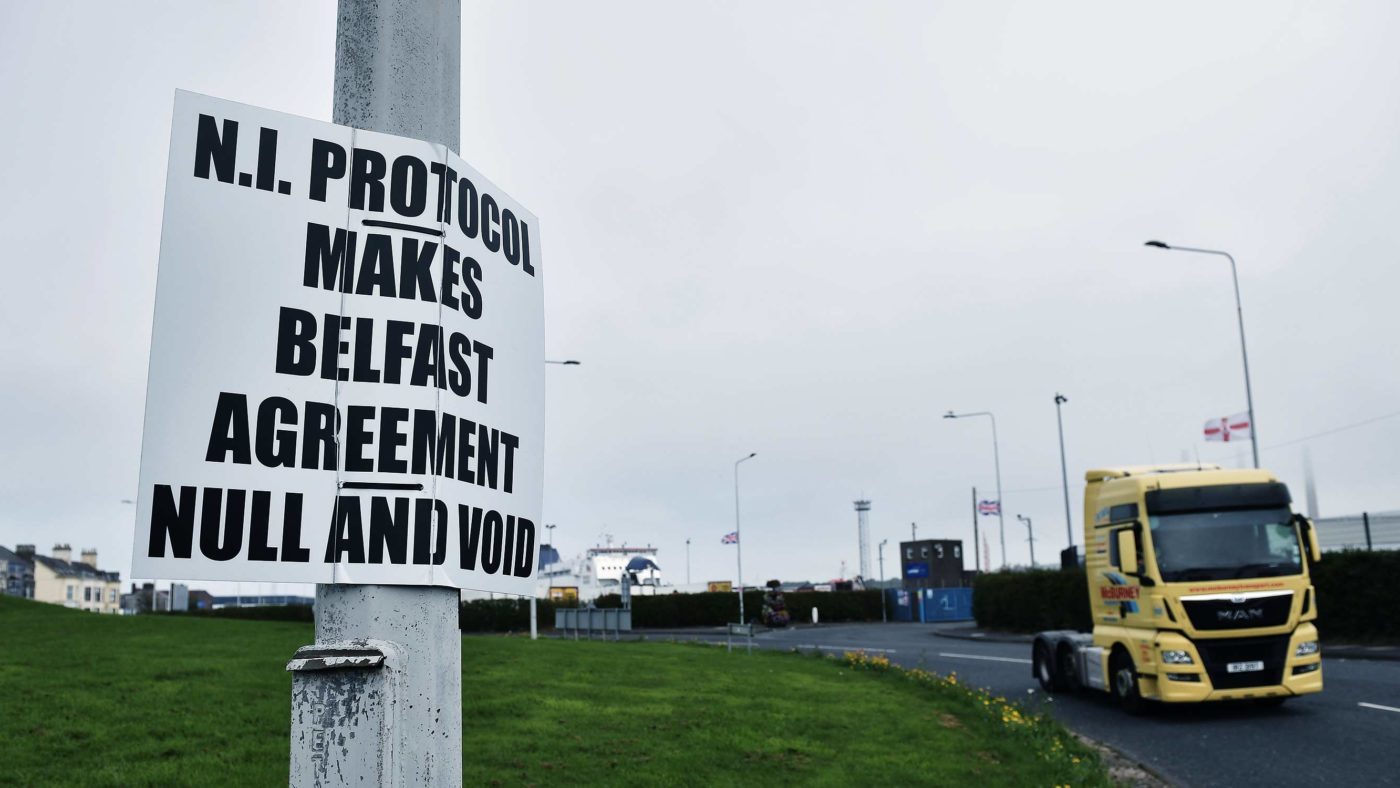Who is the bigger expert on the Belfast Agreement? Might it be Lord Trimble, the former Ulster Unionist who brokered the deal and won Nobel peace prize? Or could it be Tim Farron, who spent two undistinguished years as the leader of the Liberal Democrats and whose career will likely be remembered only by the nerdiest of politics geeks?
Trimble is clear that the Northern Ireland Protocol, which separates the province politically and economically from the rest of the United Kingdom, is incompatible with the peace deal. In contrast, over the weekend Farron tweeted that ‘You can’t stick to the Good Friday Agreement and take NI out of the single market.’
In fact, the idea that the Government was constrained by the 1998 accord has been tested twice in court. On both occasions judges confirmed that it does not limit the UK’s freedom of manoeuvre when it comes to Brexit.
Farron was presumably responding to the resignation of the Brexit minister, Lord Frost. His departure is a setback for Unionists because he was clear about the problems that the Protocol created. He recognised that the Irish Sea border not only raises difficulties for businesses, but that it is also a constitutional abomination.
Frost co-authored the Government’s command paper, which sought to return the Protocol to its original purpose and restore Northern Ireland’s place in the UK internal market. He realised that if goods could move from Great Britain to the province without impediment, if British rules governed products for sale in the NI market and if the EU’s authority over Ulster’s economy was removed, then the sea border would be defanged.
Frost was adamant that the test for triggering the Protocol’s emergency brake, Article 16, had been met. That provision permits unilateral action if the deal leads to ‘serious economic, societal or environmental difficulties’ or a ‘diversion of trade’.
In Northern Ireland, Unionists, who are frantically worried about their place in the UK, believed that Lord Frost was the man who would persuade Boris Johnson to trigger Article 16. The Government threatened to use it to suspend contentious aspects of the sea border, while legal proceedings and an arbitration process took place, but as the months have gone by this prospect seems more remote.
Unionists will be a little heartened by the appointment of Liz Truss, who will now oversee negotiations with the EU about the protocol. She has cultivated a tough, Margaret Thatcher-type image. If she can force Brussels to accept Northern Ireland’s integral place in the UK, she will enhance her chances of becoming the next Conservative leader, while any form of capitulation to the European Commission will end that prospect.
Tim Farron may not have noticed, but the political temperature at Stormont is rising dangerously, thanks to the Union-trashing Protocol. For months, the Democratic Unionist leader, Sir Jeffrey Donaldson, has threatened to end his party’s participation in the power-sharing executive, if the sea border is not removed.
The first deadline for this ultimatum was at the end of October. Donaldson decided to give the process ‘a little more time’ because the EU had reopened ‘serious negotiations with the UK government’. “’No serious person could deny that this represents significant and positive progress,’ he claimed at the time.
It’s become impossible to pretend that that progress has been sustained. While the EU seems inclined to drop its threat to block medicines from coming into Northern Ireland, it has given up nothing on the key issues around trade and the European Court of Justice. It still plans to grab power over this part of the UK and put punishing barriers between the province and its most important market in Great Britain.
Last week, Donaldson met the EU negotiator Maros Sefcovic. Before the meeting he saidL:
‘The (DUP’s) continued participation in the political institutions is not sustainable in the absence of action to remove the Irish Sea border… (There is) a small window of opportunity to begin the process of restoring Northern Ireland’s place within the UK’s internal market.’
If the Stormont Assembly survives that long, there will be an election in May next year. If there is no progress on removing the worst elements of the protocol, and if Donaldson has still not collapsed the institutions, his credibility will be destroyed.
The DUP may not have been wise to issue this threat, but having made it, he will not have any choice but to follow through early next year. Perhaps he can argue that Truss needs more time to negotiate an agreement, but the strength of that argument will diminish as it gets closer to polling day.
The Northern Ireland Protocol is a challenge to the province’s place in the UK and it is also an affront to the Belfast Agreement. You won’t hear this from the likes of Farron, but that document was underpinned by the ‘principle of consent’, which guaranteed NI’s British status so long as it was supported by a majority of people in the province. The Irish sea border, in contrast, makes Northern Ireland’s populace second class citizens of the UK.
Anybody who is genuinely concerned about the Belfast Agreement should address that, rather than talking nonsense about the single market.
Click here to subscribe to our daily briefing – the best pieces from CapX and across the web.
CapX depends on the generosity of its readers. If you value what we do, please consider making a donation.


